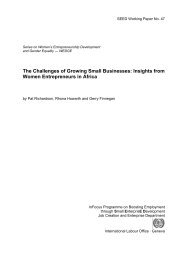manual: women workers' rights and gender equality - International ...
manual: women workers' rights and gender equality - International ...
manual: women workers' rights and gender equality - International ...
You also want an ePaper? Increase the reach of your titles
YUMPU automatically turns print PDFs into web optimized ePapers that Google loves.
Rest period<br />
There are no official rules regarding rest time in the Labour Code 1997<br />
Overtime <strong>and</strong> overtime payment<br />
If workers are required to work overtime for exceptional <strong>and</strong> urgent jobs, the overtime hours shall be<br />
paid at a rate of fifty per cent (50%) higher than normal hours. If the overtime hours are worked at<br />
night or during weekly time off, the rate of increase shall be one hundred per cent (100%) (Labour<br />
Code 1997, chapter 6, section 2, article 139). Night is defined as the period from 22:00 to 5:00.<br />
Weekly rest<br />
Weekly time off shall be a minimum of twenty four (24) consecutive hours. All workers shall be<br />
given in principle a day off on Sunday (Labour Code 1997, chapter 6, section 4, article 147). In<br />
some categories of work, it is allowed to give the weekly day off through a rotating system,<br />
examples are: hospitals, hotels, restaurants, publishers of newspapers, enterprises supplying<br />
electricity or water.<br />
Holidays<br />
In chapter 6 of the Labour Code 1997, sections 5, 6 <strong>and</strong> 7 deal with paid holidays, paid annual<br />
leave <strong>and</strong> special leave.<br />
Paid holidays<br />
Paid holidays are fixed in advance on a yearly basis by the Ministry in charge of Labour. These<br />
paid holidays do not break off the length of service required to obtain paid annual leave, nor do<br />
they reduce this type of leave. In case the public holiday coincides with a Sunday, workers will<br />
have the following day off. Time off for holidays can not be a reason for reducing wages.<br />
Paid annual leave<br />
Unless there are more favorable provisions in collective agreements or individual labour contracts,<br />
all workers are entitled to paid annual leave to be given by the employer at the rate of one <strong>and</strong> a<br />
half work days paid leave per month of continuous service. The length of paid leave as stated<br />
above is increased according to the seniority of workers at the rate of one day per month for every<br />
three years of service.<br />
Special leave<br />
The employer has the right to grant a worker special leave during the event directly affecting the<br />
worker’s immediate family. If the worker has not taken yet his or her annual leave, the employer<br />
can deduct the special leave from the worker’s annual leave. If the worker has taken his or her<br />
annual leave already the employer can not deduct the special leave from the worker’s annual leave<br />
for next year.<br />
Related sessions <strong>and</strong> briefing notes<br />
4.20 Occupational Safety <strong>and</strong> Health<br />
Briefing Note 9 Violation of Rights at Work: File a Complaint<br />
95

















